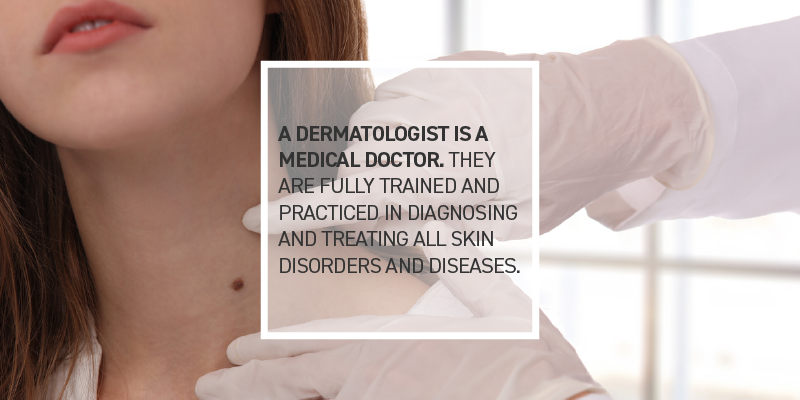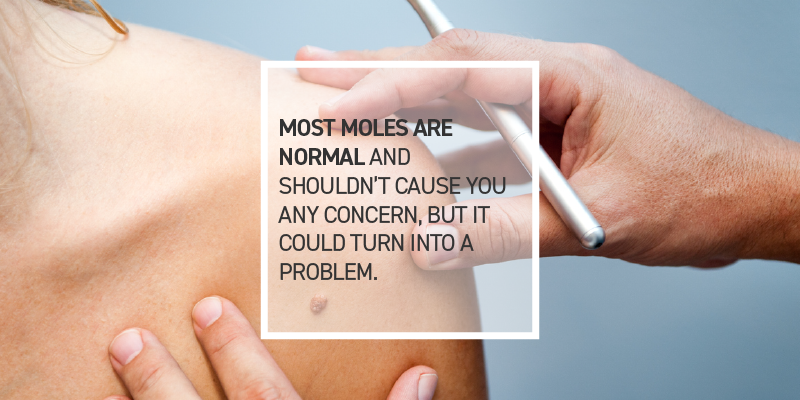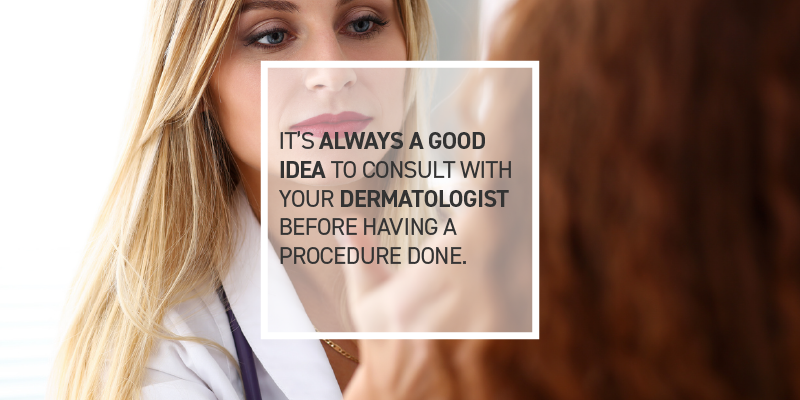
You got caught.
You got caught by your new boyfriend, gazing into the vanity mirror staring cross-eyed at that mark on your cheekbone, wondering if you should call and schedule an appointment with your dermatologist. It’s probably about time you stop by to say hello, anyway, right? I mean, you haven’t seen him since your panic attack over your high school acne. Now would be as good a time as any to get reacquainted.
The boyfriend raises an eyebrow questioningly before slipping out of the room again, as silently as he entered.
You go back to worrying into your reflection and wondering just how long that brown mark had been there before you finally took notice.
When making decisions on when to schedule appointments for skincare, everyone goes through the inner struggle of trying to decide when they’ve had enough, and when they’re being a pansy. We all suffer from breakouts from time to time. Many of us even deal with allergic rashes on occasion. So how do you really know when you should tough it out, when you should visit your favorite aesthetician, and when it’s time to really get serious and call the doctor.
The Difference Between an Aesthetician and a Dermatologist

There are a great many differences between what the two professionals actually do.
To simplify, “A dermatologist is a medical doctor who has completed pre-medical studies in undergrad, four years of medical school, a one-year internship most commonly in internal medicine, three years of dermatology residency, and has passed national examinations for licensure and board certification,” explains Dr. Hadley King, dermatologist at NYC’s Skinney Medspa. They are fully trained and practiced in diagnosing and treating all skin disorders and diseases, they’re able to write prescriptions, perform surgeries, and treat skin cancers. They play an important role in educating, screening, and treating various skin issues.
An aesthetician attends a trade school after completing their high school diploma or GED. The study between three to six months in preparation for passing the state board exam. They work with the care and maintenance of skin allowing for practicing skin analysis, facials, cosmetology, and microdermabrasion. With further schooling, a master's license will allow an aesthetician to perform procedures like laser skin resurfacing, laser hair removal, and some chemical peels. They may decide to work with patients through the treatment and recovery of burn victims. Don’t be afraid to look for the aesthetician school certificate and a state license hanging on the wall. Their ability and knowledge are primarily relative to their experience. “Someone who has been doing facials for 10 years is going to have better skills in, say, extraction than someone fresh out of school,” King says.
When to Visit the Dermatologist

Some general guidelines to follow:
Acne that won’t go away: If your acne isn’t responding to anything you do, whether naturally or OTC, you may want to call your dermatologist. They can determine a prescription treatment that would be most effective for you.
A mole that is new or changing: Most moles are normal and shouldn’t cause you any concern, but it could turn into a problem. They can be a serious risk for melanoma, so if you notice any of yours changing in size, color, or shape, see your dermatologist right away. Ditto for any new ones that pop up. “A change in a mole or growth on the body that’s itchy, bleeds, or doesn’t heal on its own is generally the first sign of skin cancer,” says Joel Schlessinger, M.D., a board-certified dermatologist.
You should also see your dermatologist on a regular basis to be screened for other forms of skin cancer, particularly if you are at high risk: fair-haired and/or light-eyed, or if you have a history of blistering sunburns, according to the National Institutes of Health. “As dermatologists, we know that the early detection of skin cancer by routine skin examinations is crucial for successful treatment,” says Robert S. Kirsner, MD, Ph.D., chair of the department of dermatology and cutaneous surgery at the University of Miami Miller School of Medicine.
Dry, itchy, irritated skin or a rash that won’t heal: Dry skin nags at the best of us, but if you’ve tried lotions and creams on those patches and they’re still persistent, it’s time to visit your skin doctor to see if better treatment could help. You could be suffering from a common, chronic skin condition called eczema.
Painful, cystic pimples: The painful, giant nodules aren’t caused by a dirty face. They’re the result of hormonal fluctuations, stress, and bacteria that is more difficult to control than normal. Your dermatologist may inject a steroid into the nodule to reduce the pain and inflammation and help speed healing. There are some longer-term treatments your dermatologist may prescribe like retinoids, Accutane, or birth control.
Rough, scaly patches on scalp, knees, elbows, or lower back: These could be symptoms of psoriasis. “Psoriasis is caused by an autoimmune disorder where the immune system sends signals that tell skin cells to grow too quickly,” says Schlessinger. “This means the body cannot shed these skin cells fast enough, causing them to pile up on the skin’s surface and cause red, thickened, silvery scales.” Your dermatologist may prescribe any one of a variety of treatments, depending on your individual needs and medical history.
Sudden sun sensitivity: If you suddenly notice your skin being extra sensitive to the sun, this could be a symptom of lupus.
Better to Be Safe Than Sorry

Generally speaking, “If you’re healthy and you haven’t had any complications with facials in the past, it’s ok to see an aesthetician for basic skincare procedures like a facial,” says Peggy Fuller, MD, founder, and director of the Esthetic Center for Dermatology, a medical spa in Charlotte, N.C.
No matter how much you trust your aesthetician, it’s always a good idea to consult with your dermatologist before having a procedure done. You want to be sure that the elective is what is best for your skin.
For more complicated procedures, see a dermatologist. More involved, complex procedures such as laser hair removal and BOTOX® injections should be performed by a dermatologist. “The bottom line is to always err on the side of caution. If the cosmetic procedure seems like something the aesthetician doesn’t have knowledge of, says Fuller, “it’s always good to be a healthy skeptic.”
Going to a medical spa gives you the best of both worlds. You get the relaxing luxury of a spa setting, with the certified center for dermatology to oversee treatment. Usually, aestheticians in medical spas have been trained by dermatologists, so they have a better idea of when to call in a doctor for a condition that’s outside their scope.
Skin Care Tips From MDSUN Skin Care®
Please Visit Our Official Website - MDSUN Skin Care



Comments
Post a Comment